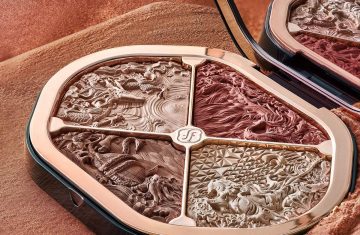Ever since Generation Z emerged as the primary consumer force in the realm of beauty and skincare, numerous merchants have identified pivotal variables driving brand sales amongst the youthful demographic.
Within the realm of skincare, products targeted at the younger generation often focus on fundamental functionalities such as cleansing, moisturizing, oil control, and acne treatment. North American skincare brand Beekman 1802 seized upon the youth’s desire for utmost purity in skincare, showcasing a range of products featuring goat milk as a hallmark ingredient, thereby garnering a legion of devoted Gen Z enthusiasts.
In the year 2023, Beekman 1802 collaborated with Nestlé to unveil a series of body care products boasting the fragrances of six types of cookies. Remarkably, within just 60 minutes of its release, the sales revenue surpassed the million-dollar mark, soaring to over $1.6 million by the day’s end, demonstrating the formidable sales prowess of the brand’s fan base. Beekman 1802 anticipates achieving a sales revenue of $25 million in the year 2024.
How did Beekman 1802 harness the concept of pure skincare to amass a vast following among Gen Z and achieve million-dollar sales within an hour?
Innovative Concept of Goat Milk Skincare
Founded by Drs. Josh and Brent in 2008, Beekman 1802 embarked on a journey to New York’s historic Beekman 1802 farm. There, they discovered residents using goat milk to craft facial cleansers, recognizing the commercial potential therein. Promptly, they established the skincare brand Beekman 1802, with their inaugural product being goat milk soap.
Subsequently, the company doubled down on goat milk, expanding its product line to encompass goat milk exfoliating cleansers, lip balms, and masks, thereby evolving into the world’s largest goat milk skincare company.
While initially targeting the mid-to-high-end segment with its nutritionally pure skincare line, Beekman 1802 observed that customers drawn solely by ingredient-based selling points exhibited lower rates of repeat purchases. Upon segmenting the audience by age, the brand identified Gen Z as the most enduringly interested cohort in goat milk formulations.
To better engage Gen Z consumers, Beekman 1802 devised an array of promotional strategies, including a vegan goat milk range and a rejuvenated brand matrix catering to a younger demographic. For instance, following a 15-year brand revitalization effort, founder Josh remarked, “Beekman 1802’s core consumer demographic now comprises millennials. Our latest Shine-Free series features products priced at $30 or below, aimed at enticing younger consumers.”
Beekman 1802 discovered that goat milk boasts 31 essential skincare nutrients. Through technological breakdowns, they created fully vegan goat milk alternatives. For instance, the Shine-Free series incorporates Beekman 1802’s latest vegan formulations, touted to deliver comparable efficacy to goat milk products at a fraction of the price. This entry-level, youth-centric product line garnered immense favor among young consumers, with Beekman 1802 witnessing an 80% surge in sales following the series’ launch.
Nostalgic Collaboration Approach
In an era where collaborations have become the focal point of marketing endeavors, navigating the intricacies of brand partnerships to carve out new markets, shape brand awareness, and facilitate cultural exchange poses a challenge for marketing departments.
Beekman 1802’s collaboration with Toll House on the cookie-scented series of body care products represents a resounding commercial success. In November 2023, Beekman 1802 announced its partnership with Nestlé to introduce a range of body care products infused with the fragrances of six varieties of cookies.
According to Beekman 1802, following the joint release, sales exceeded $1 million within the first hour. By the end of the day, sales figures from QVC (the largest television shopping platform in the United States) and direct-to-consumer channels surpassed $1.6 million, with 40% of Beekman 1802’s direct-to-consumer sales stemming from new customers.
Brand Ark’s Perspective on Beekman 1802 and Nestlé Collaboration: Leveraging Shared Values, Mutually Beneficial Partnerships, Omnichannel Operations, and Nostalgic Appeal
1. Organic Alignment of Brand Values
When discussing the collaboration between Beekman 1802 and Nestlé, both brands’ values center around themes of family, health, quality, and multigenerational appeal. Particularly in the current era of inflated customer acquisition costs, leveraging existing customer bases that align with one’s brand values can result in mutually beneficial outcomes.
Beekman 1802 and Nestlé collaborated to launch five products: hand cream, hand soap and body wash, body lotion, lip balm, and soap, priced between $15 and $39.
2. Mutually Beneficial Partnership Model
By assuming primary responsibility for production and inventory risk, Beekman 1802 waived the licensing fees associated with the collaboration, while Nestlé generously allowed Beekman 1802 to leverage Nestlé’s robust social media accounts.
With 630,000 followers on Instagram, Nestlé far surpasses Beekman 1802’s 130,000 followers. Through this collaboration, Beekman 1802 attracted the attention of Nestlé’s Instagram users through a co-creation model. Following the collaboration, Beekman 1802 witnessed over 100% increase in engagement on TikTok and Instagram compared to normal. To attract more passersby to the joint venture, Nestlé and Beekman 1802 also launched street-style challenges. By taking the products to the streets and randomly selecting passersby for scent assessments, they enhanced the novelty and participation of the collaboration. For this collaboration, Beekman 1802 invited Nestlé’s corporate chef, Meredith Tomason, to collaborate with their product development director, Ayesha Bshero, on TikTok videos showcasing the unique scents of Beekman 1802’s new products, consistent with the freshly baked taste of Nestlé cookies. This video, aired on Beekman 1802’s TikTok account with 110,000 followers, garnered over 20 million views.
3. Omnichannel Operations
In addition to Black Friday promotions on Beekman 1802’s independent website, QVC (the largest television shopping platform) also served as a major channel partner for the collaboration.
In the United States, viral marketing often begins with television sales in addition to TikTok marketing. Since 2018, QVC has been a crucial component of Beekman 1802’s business model. Beekman 1802 has consistently captured the attention of television shoppers through diverse advertising styles, including custom animations and captivating videos, with its playful tone often infusing broadcasts with a relaxed atmosphere. The brand’s omnichannel sales strategy also includes retailers such as Ulta Beauty, Nordstrom, HSN, and Amazon. The brand continues to expand its direct-to-consumer influence, including recent additions like Shopify Markets Pro for international expansion. The highest sales of the collaboration products in international markets are in Canada, Japan, and Estonia.
4. Nostalgic Appeal
Beekman 1802 has always leveraged nostalgia as a key differentiating factor for its brand. Earlier, Beekman 1802 collaborated with Hasbro, releasing a home exfoliating product named Potato Peel, themed after the classic 1953 toy Mrs. Potato Head, priced at $49.
In this collaboration, to enhance customer trust in the cookie-scented products, Beekman 1802 also enlisted the renowned perfume brand Givaudan for fragrance development. The perfume company utilized the new Z-biome fragrance technology, which nurtures skin microbiome health with milder ingredients than traditional fragrances. Hence, these formulations are particularly suitable for sensitive skin, a key selling point of Beekman 1802’s collaboration.
Cross-category collaborations should not end with the collaboration itself. As global consumer markets trend toward sobriety and objectivity, current collaboration appeals are returning to a track of parallel spirituality and practicality.
In the increasingly competitive beauty and skincare market, a brand’s ability to stand out still depends on the battle of brand strength. From a business logic perspective, upgrading brand image and product positioning also contributes to driving brand performance and long-term growth potential.
The reason Beekman 1802 has been able to shine anew in the market and cultivate a loyal group of youthful consumers from Generation Z is not only due to a decade of research and market studies but also continuous optimization and upgrading of its products during the ongoing market penetration process.
In the future, for brands targeting Generation Z, genuinely unique technological achievements and the ability to shape new classics will be the comprehensive breakthroughs to stand out from the crowd.




